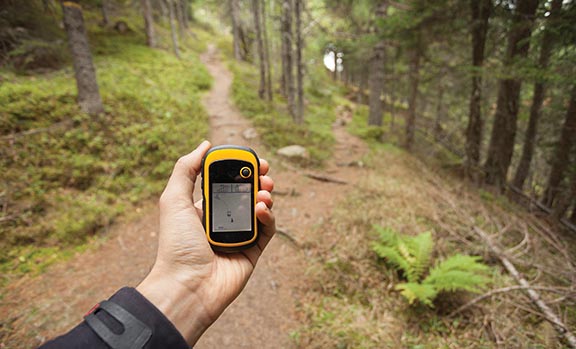Geocaching

The Hidden World of Geocaching
A game (quietly) taking the world by storm
By Robert Michon
Geocaches are everywhere. In fact, you’re probably within walking distance of one right now. Alarmed? Don’t be. Geocaching is a fun exploration game that’s gained a strong following in the Edmonton area. In fact, Strathcona County is home to the second-oldest geocache in Canada. But how exactly do you play? Where did it even come from? And how do you get started? Wonder no more. We’ve got all the info you need to become a geocacher extraordinaire.
Just What Is Geocaching?
Geocaching is a type of way-finding game that uses GPS technology in order to lead players on a kind of scavenger hunt. Members of the geocaching community hide small waterproof containers in locations all around the world and post coordinates online for other geocachers to find. The containers always contain a logbook and, sometimes, a small trinket as a reward. When you find a geocache, you are meant to sign and date the logbook as proof of your victory, and you can even take a trinket from the cache, as long as you leave one of your own for the next geocacher to find. Anyone at all can play, as long as your cellphone has GPS capability.
Geocache coordinates can bring you to almost any location, and they’re a great excuse to get out and explore. You’ll be finding hidden vistas, great trails and viewing your city from a fresh perspective.
A Brief History
Geocaching hasn’t been around long; its roots trace back only 16 years. In May of 2000, the American military made their jealously guarded GPS technology available to the general public, and only two days later, people had already begun to hide caches for their friends to find. The very first geocache was hidden in Portland, Oregon, and it was an instant hit, quickly spreading beyond the group of friends it was initially meant for. Today, geocaching is a worldwide phenomenon, with caches to be found on every continent. One has even left Earth entirely and is hidden aboard the International Space Station.
Rules of the Game
While the rules can vary by location, there are some basics for everybody to keep in mind to make the activity safe and fun for everyone. First off, geocaches cannot be placed on private property without the express permission of the owner. High-security areas, such as government buildings and schools, are typically off-limits, too. Geocaching employs a “leave no trace” policy, meant to preserve the natural state of the location. That means no garbage, vandalism or destruction of the area in your hunt for the cache, and if players find a disturbed site, they’re encouraged to clean it in order to preserve the reputation of the game.

Game Types
While there are hundreds of permutations of the game available, there are four main types that can easily be found around the city.
Traditional caches are the basic cache type that started the whole trend. You get a set of coordinates, maybe a hint if you’re lucky, and you set off looking.
Puzzle caches (sometimes called mystery caches) make you work for those essential coordinates. They’re hidden within a riddle, cipher or some other puzzle, which must be solved before the hunt can even begin.
Multi-caches take you on a bit of a ride. Instead of a notebook to sign, each cache contains yet another set of coordinates, which ultimately brings you to the final location.
Event caches are gatherings of 50 or more people (rather than typical small groups), all competing to find the most caches in an area in a certain amount of time. Even mega-events (which include a minimum of 500 people) are planned.
Whether you love solving mysteries, being taken on tours, visiting scenic vistas or exploring underrated locations, there is probably a geocaching variant to suit your ability level and interest. It’s fun for families. It’s fun with friends. And it’s even fun alone. Now that you know all about it, you’ve got no excuses. Get out there and start caching!
Geocaching Lingo for Beginners
Muggle: a non-geocacher
FTF: First to find. A high achievement for cachers.
BYOP: Bring your own pen. Make sure you sign the logbook!
DNF: Did not find. Better luck next time.
GZ: Ground zero. You’re in the right spot. Take a look around.
Power Trail: Multiple caches in quick succession for easy finds.
Trackable: Trinkets that travel from cache to cache.
More Like This
Backyard Home Theatre
Read
Edmonton From Above
Read
‘Motoring’ around Edmonton
Read





